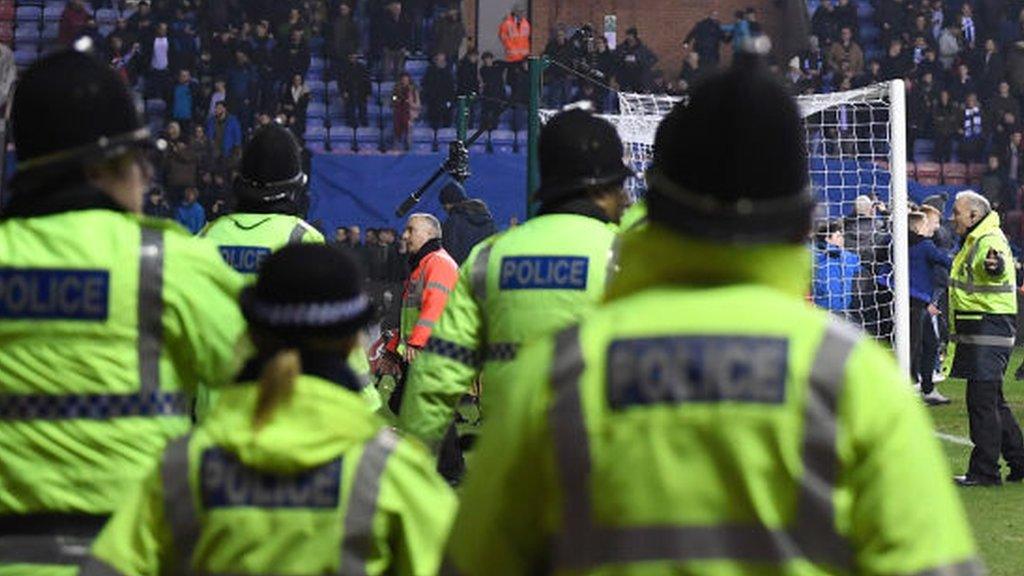Premier League and EFL football matches 'over-policed'
- Published
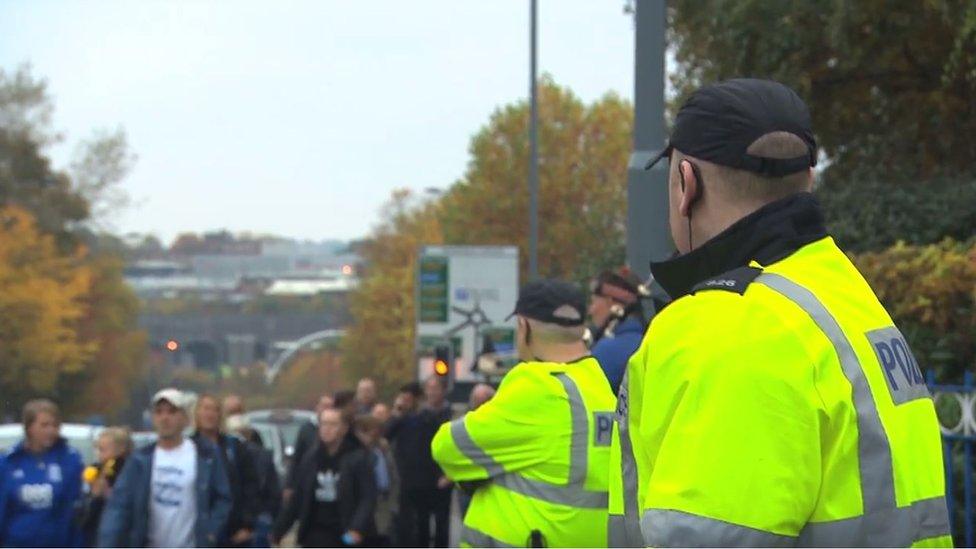
Some of the most-heavily-policed football matches in the UK had one officer present for every 50 fans, prompting calls for a review.
The BBC asked forces across the UK for information about the costs of policing football matches, as well as the numbers of officers deployed.
Critics say large numbers of officers contribute to tensions on match days and the staffing is "unsustainable".
Police say they use the minimum resources necessary to avoid disorder.
Amanda Jacks, a caseworker at The Football Supporters' Federation, said high numbers of officers did not match the "few individuals within crowds of thousands" who posed a risk.
"A high concentration of police definitely has an impact on fans. Everybody has to take responsibility for their own actions but how supporters are policed and stewarded plays into the dynamic on match days," she said.
"Policing tactics will play into that dynamic.
"If there is a police escort or line around away fans, they are immediately creating a focal point that will heighten tensions between two sets of fans - the away fans inside will be jeered at and they will jeer those outside.
"The public perception may easily be 'look at all those violent yobs and all the police needed'."
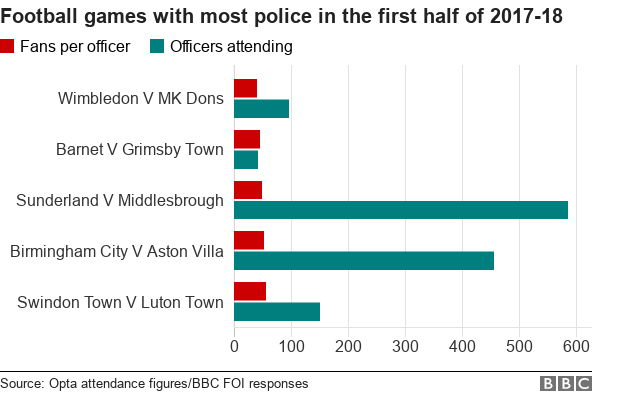
The BBC sent Freedom of Information requests to 37 police forces covering football teams in the Premier League, English Football League, Scottish Championship and Scottish Premiership and compared the responses to attendance figures from the statistics company Opta.
Our analysis found:
The number of officers sent to matches ranged from zero to a peak of 587 when Middlesbrough visited Sunderland - an officer for every 50 spectators
The most-heavily-policed Premier League fixture was Tottenham Hotspur vs West Ham United at Wembley Stadium with 477 officers, one for every 105 spectators
There is a wide variation across police force areas in how much of the costs they recoup
The most expensive policing operation in England was Sheffield Wednesday against Sheffield United at Hillsborough, which cost £203,000. The home club was billed for £41,000.
In Scotland, the most expensive policing operation was Rangers vs. Celtic at Ibrox at £64,000
Dr Geoff Pearson, an expert in policing, crowd behaviour and sport within the School of Law at the University of Manchester, said it was "not sustainable" to police games in such numbers.
"All crowd science shows positive engagement with fans and police cuts down on disorder.
"One of the other drawbacks of large numbers of police trying to manage a large crowd, is inevitably you are going to be cancelling officers' rest days.
"That's problematic for communities [when officers have to take their rest days another time], and the officer may not be in the best mood to deal with football banter."

'Football has changed'
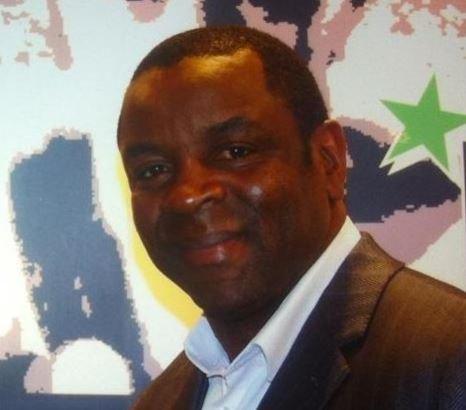
Walton Wilkins was a member of a football hooligan group linked to Birmingham City, for around 20 years, before ceasing his involvement in 2002.
Now a car parts business owner, Mr Wilkins said there was less violence at games now than in the 1980s and the game had changed.
"With the amount of CCTV they can use and drones too, the threat is not as great," he said.
"The potential for banning orders lasting years and tough prison sentences mean hooliganism is just not worth it."

Government figures, external show a rise in arrests for pitch invasions last year, but a fall in overall arrests and a drop in the number of football banning orders being issued.
However, separate figures compiled by police forces for the top five leagues in England, and given to the BBC previously, show incidents of disorder have been on the rise.
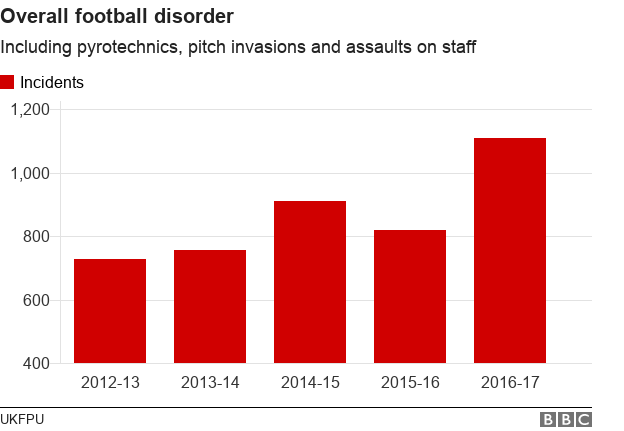
Deputy Chief Constable Mark Roberts, national lead for football policing, said he would "quite frankly love football not to require any policing".
"We are subsidising a multi-million-pound business," he said.
He said his force, South Yorkshire, made a "significant loss" covering football - the equivalent of funding the salaries of 27 officers for one year.
Football hooligan firms had dwindled from their peak in the 1980s, he said, but they had been replaced by fans indulging in "drink-fuelled disorderly behaviour".
"There's no driver within the whole service to have more people at football matches," he said. Decisions about each match are intelligence driven and case specific, he added.
The Metropolitan Police Service said it recovered about 5% of policing costs from football clubs because it only received money back for policing inside the stadium.
"We assess risk on a match by match basis, taking into account all the available intelligence, and deploying officers as appropriate," a spokesman said.
"Since the recent terrorist attacks we have also reviewed policing plans for all events across London, with the safety and security of the public our paramount concern," he added.
The Home Office said it did not deal with police operational matters.

More about this story
The Shared Data Unit makes data journalism available to news organisations across the media industry, as part of a partnership between the BBC and the News Media Association.
For more information on methodology, click here, external. For the full dataset, click here, external. Read more about the Local News Partnerships here.
- Attribution
- Published26 February 2018
